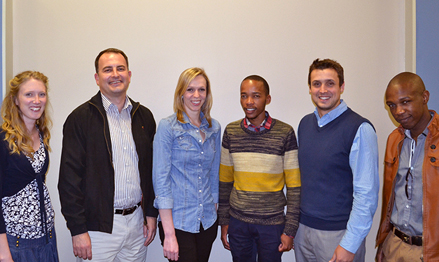Latest News Archive
Please select Category, Year, and then Month to display items
26 July 2022
|
Story Bulelwa Moikwatlhai
|
Photo Supplied
 Experiencing the UFS in person for the first time are from the left: Sandor Potjer (VU Amsterdam), Bulelwa Moikwatlhai (UFS OIA), Ricarda Kochems (Bremen University, Germany), Froukje Pronk (VU Amsterdam) and Matome Mokoena (UFS OIA)
Experiencing the UFS in person for the first time are from the left: Sandor Potjer (VU Amsterdam), Bulelwa Moikwatlhai (UFS OIA), Ricarda Kochems (Bremen University, Germany), Froukje Pronk (VU Amsterdam) and Matome Mokoena (UFS OIA)
As the UFS COVID-19 Regulations and Required Vaccination Policy has been lifted with immediate effect – allowing 100% capacity of both students and staff members and a fully operational campus – the
Office for International Affairs welcomes its first physical exchange cohort after two years. The cohort of students hail from the various international partners of the UFS, namely the
University of Bremen in Germany, the Vrije Universiteit Amsterdam, and Sciences PO Bordeaux in France. The students will be hosted in the UFS faculties of the Humanities, Economic and Management Sciences, and Natural and Agricultural Sciences, respectively.
These students have been paired with
Umoja Buddy Programme ambassadors to help ensure their smooth transition and integration into student life at the UFS. Furthermore, the students received an invitation from the President of the
International Student Association (ISA), Courtney Madziwa, to join their association, thus exposing them to students from other countries to learn about the various cultures.
On 18 July, the Office for International Affairs (OIA) arranged a hybrid orientation programme for the exchange students, including those students who have not yet arrived on the Bloemfontein Campus. The students took part in an icebreaker activity, where they had the opportunity to learn from and teach other participants about their home countries. Dr Cornelius Hagenmeier, Director of the OIA, welcomed the exchange students to the Bloemfontein Campus, and expressed excitement to have physical exchanges again. Furthermore, the guest presenters ranged from student leadership, staff members, and service providers.
The presentations were practical, demonstrating, among others, how to create a password on the institutional website – presented by Mr Molemo Mohapi from UFS ICT. The presentation on how to fully utilise Blackboard was facilitated by Ms Vuthihi Mudau from the UFS CTL division. We take the safety of all our students seriously, so Ms Elise Oberholzer from the UFS Protection Services has given the students some tips on how to safeguard themselves.
UFS gets support for improving university access and success in South Africa
2013-10-24
|
 |
|
Members of the SASSE Research team are from left: Carike Jordaan, Dr Francois Strydom, Lana Swart, Seisho Gaboutlwelweboutlwelwakemo, Michael Henn en Katleho Nyaile.
Photo: Supplied
24 October 2013 |
The university’s Centre of Teaching and Learning (CTL) received a grant for US$820 000 (about R8 million) from the Kresge Foundation for their South African Survey of Student Engagement (SASSE) research team.
The SASSE research team is committed to furthering student access with success by promoting quality teaching and learning institutionally and promoting collective impact around student success nationally.
Through this three-year project, the SASSE team aims to provide a range of deeply contextualised and globally benchmarked student engagement measures that can be used at institutional and module/course level for the South African context. The data from these measures can be used to improve the quality of undergraduate teaching and learning, and participating institutions will have access to appropriate capacity development interventions to empower them to use the data to promote evidence-based change in their institutions.
Dr Francois Strydom, Academic Director at the CTL, says the lessons from this higher-education project could be used to develop a stronger post-school sector which could help the country to deal with the massive challenge of youth unemployment; thereby promoting equity, social justice and a prosperous democracy in South Africa.
The Kresge Foundation is a private philanthropic foundation in the United States, which is focused on creating opportunity for low-income people through various programmes. This three-year project forms part of the Kresge Foundation’s Education Programme, which focuses on promoting access and success at South African universities. Therefore the SASSE project aims to contribute to the Kresge-sponsored Access and Success in Higher Education in South Africa (ASHESA), to promote a national conversation on improving student success.
In January this year, the university was one of four South African universities selected to take part in a multi-million rand programme to bolster private fund-raising and advancement efforts. For this programme the UFS was granted US$640 000 (about R5,6 million) over a period of five years.